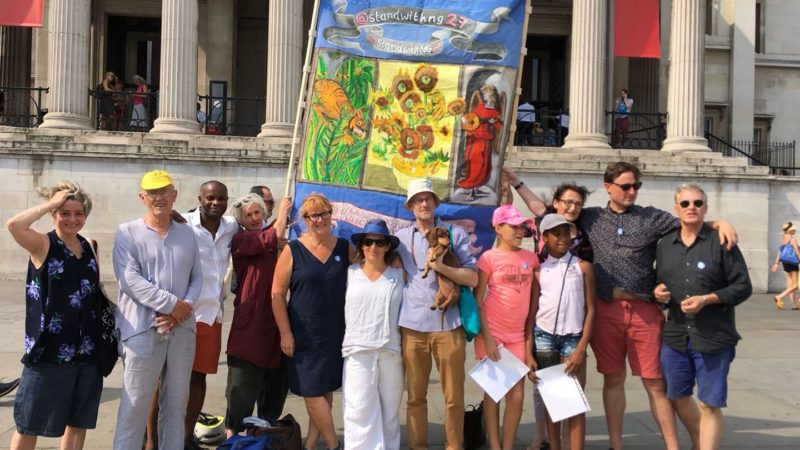The renowned museum sacked 27 workers last year without prior notice or compensation. Now they're fighting to be recognised as employees like any others.

Art educators are taking taking London’s National Gallery to court after the world-famous art centre sacked them without further compensation.
A total of 27 regular contributors to the Gallery’s art education programmes were dismissed in October 2017 without consultation or further benefits, as bosses claim they were self-employed rather than employees.
Inspired by the struggles of Uber drivers and Deliveroo couriers, the so-called NG27 are taking the National Gallery to the Central London Employment Tribunal next Monday, November 24, in hopes of seeing justice.
One of the disgruntled workers is Marie-Therese Ross, who worked for the National Gallery for 24 years. She said:
“This isn’t just about us. Our case highlights the exploitation of precarious workers across the arts and beyond.
“We are standing up for fair employment rights and calling for our public arts organisations to value the expertise and experience at the heart of their education programmes.”
Of the 27 art educators sacked only eight were offered permanent employment contracts, and even those on reduced salary and working terms.
The workers are not consenting to the new conditions or the idea that they were mere contractors on site. They’ve argued that if they were paid through the National Gallery payroll, taxed at source and required to attend training and appraisals they should have the same rights as staff members on permanent contracts.
The longest-serving claimant, James Heard, worked at the National Gallery for 45 years. He argued that the NG27 struggle went beyond their individual cases, saying:
“We are standing up for fair treatment for staff in the arts, and to protect the teaching expertise at the heart of our museums.
“Our national galleries are something the UK is extremely proud of and it is vital that the educators who hold the collective knowledge of these places are properly protected.”
A judge will rule on December 7 whether the NG27 are owed the same rights and conditions as other staff at the museum. There have been a total of four preliminary hearings, with the first having taken place in July this year.
It will also be up to the employment tribunal to decide whether workers without permanent contract ought to have the right to collective consultation prior to termination of contract – a new point of law. The case could set a precedent in the protection of the rights of ‘casual workers’.
Today we signed and submitted our witness statements. 10s of 1000s of words, hundreds of collective years, and countless fond memories of working with some of the world’s greatest paintings. We miss it hugely. https://t.co/dQmIspOpDW#crowdfunding #artsed pic.twitter.com/2XriOaNU7k
— standwithNG27 (@standwithNG27) November 16, 2018
The case also highlights how the gig-economy mentality is now slowly encroaching into the public sector, since the National Gallery is an executive non-departmental public body, sponsored by the Department for Digital, Culture, Media and Sport.
It follows the victory of migrant cleaners at the Royal Borough of Kensington and Chelsea, who fought arduously throughout the summer to be brought in-house. They won their demands back in August after a series of walk-outs.
The NG27 workers will meet tomorrow with legislators, trade unions and press at a solidarity event hosted by Labour MPs Stella Creasy and Neil Coyle.
A crowdfunding page to cover the legal costs of the NG27 has since raised over £70,000.
Joana Ramiro is a reporter for Left Foot Forward. You can follow her on Twitter for all sorts of rants here.
Left Foot Forward doesn't have the backing of big business or billionaires. We rely on the kind and generous support of ordinary people like you.
You can support hard-hitting journalism that holds the right to account, provides a forum for debate among progressives, and covers the stories the rest of the media ignore. Donate today.



